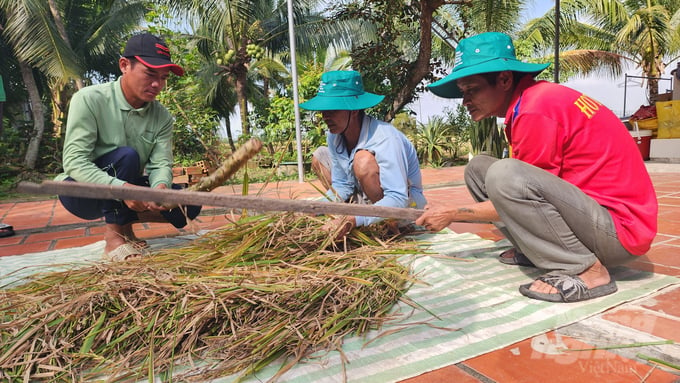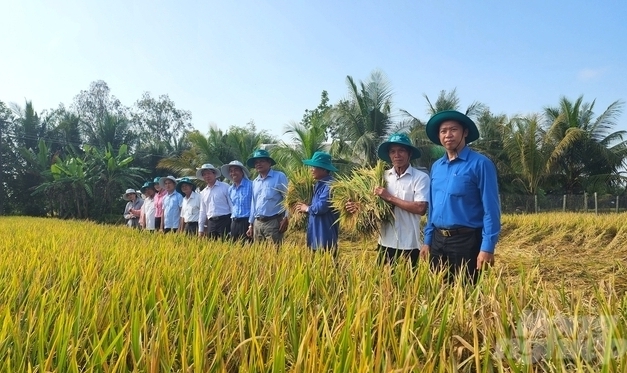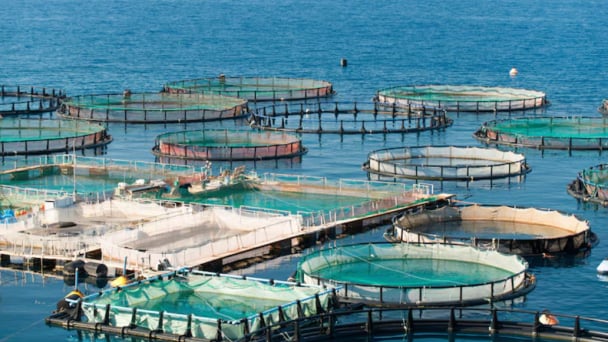June 3, 2025 | 10:45 GMT +7
June 3, 2025 | 10:45 GMT +7
Hotline: 0913.378.918
June 3, 2025 | 10:45 GMT +7
Hotline: 0913.378.918
Recently, the Department of Crop Production (MARD), in collaboration with the International Rice Research Institute (IRRI), organized to acknowledge the comments of representatives of 12 provinces and cities in the Mekong Delta (except for Ben Tre province) on the design and conduct a survey of 10,000 rice farmers on farming practices, profits - costs, farmers' awareness of climate change and greenhouse gas emissions... to build a rice production dataset of the Mekong Delta.

Department of Crop Production cooperated with IRRI to survey 10,000 Mekong Delta farmers to develop rice production data, especially for the Project of 1 million hectares of high-quality rice. Photo: Kim Anh.
According to Dinh Thi Kim Dung, Chief of the IRRI Office, this data set will calculate and compare production efficiency and rice value for the areas participating in the Project of 1 million hectares of high-quality rice.
Improving the efficiency of rice production in association with reducing greenhouse gas emissions is an urgent requirement for the Mekong Delta region to adapt to climate change and improve farmers' incomes. In recent years, rice production in the area has achieved many outstanding achievements, helping to firmly ensure national food security and contribute to providing a large amount of rice for export and generating foreign currency revenue for the country.
However, the income of most farmers is still low, and rice production in the region is also increasingly facing many adverse production conditions due to climate change, rising input prices, and increasing more demanding for product quality. Therefore, developing a regional rice production dataset is necessary to update and provide information for farmers and management agencies to direct, operate and adjust suitable production to meet development requirements.
The construction of the rice production data set must ensure the target and unify the data on the current farming methods, production costs, and profits. At the same time, assess the level of knowledge and awareness of farmers about climate change and pests, the level of participation in rice production of women, and differences in farming habits, especially understanding and awareness of ethnic minority farmers in 12 provinces in the Mekong Delta participating in the Project of 1 million hectares of high-quality rice.
This is also an opportunity to strengthen the capacity of agricultural staff to use digital tools to collect data from farmers, contributing to digital transformation in agriculture. Through the survey activities, it will provide a more scientific and practical basis for the process of developing the rice production data set in the Mekong Delta.
Through consultation, the localities contributed ideas on the questionnaire and the information to be collected about the rice production system following the actual situation in the locality. At the same time, determine the location and time of the survey in each province. In addition, IRRI will introduce survey software to serve the data collection process in the area.

The survey is an opportunity to strengthen the capacity of agricultural staff to use digital tools to collect data from farmers. Photo: Kim Anh.
According to Le Thanh Tung, Deputy Director of the Department of Crop Production, after this consultation, the Department of Crop Production will issue an official dispatch on the implementation plan to build a dataset of rice production in the Mekong Delta.
In addition, the contents exchanged and discussed will be sent by the Department of Crop Production to the Departments of Agriculture and Rural Development of provinces and cities to advise local leaders.
The Department of Crop Production and IRRI, in collaboration with partners in the Mekong Delta region, is implementing three CGIAR initiatives, including the AMD initiative to protect food systems in the great delta regions of Asia, the EiA initiative on agricultural excellence and the PHI initiative on plant health.
The main objective of these initiatives is a delta production system that is resilient to climate change. At the same time, it increases farmers' output and income by improving input materials' efficiency. Minimize damage caused by pests and diseases to critical crops, including rice. Finally, it aims to increase livelihoods and adaptability to climate change for smallholder farmers, especially women, young people, or belong to ethnic minority areas.
The survey will be conducted from August 2023 to the first quarter of 2024, divided into several phases. After the first survey, the Department of Crop Production and IRRI will conduct a preliminary review to evaluate and adjust, thereby promoting the effective implementation of subsequent surveys.
After the survey process is over, the Department of Crop Production and IRRI will review, evaluate and validate the results of contributions to the Project of 1 million hectares of high-quality rice.
Translated by Tu Quyen

(VAN) Technology is redrawing the map of Vietnamese aquaculture: more modern, greener, and more sustainable.

(VAN) Novel process harnesses machine learning to reveal groups of genes that determine how efficiently plants use nitrogen.

(VAN) Several scientists and farmers are experimenting with soil treatment in some key durian-growing regions such as Cai Lay (Tien Giang), Dak Song, Gia Nghia, and Dak R’lap (Dak Nong).
/2025/05/25/4127-3-073637_820.jpg)
(VAN) Thanks to the promotion from an FAO-implemented project, vegetable production in greenhouses in Moc Chau has seen strong development, from 1.5 hectares in 2021 to nearly 50 hectares in 2024.

(VAN) FAO has recently supported USD 140,000 to implement the project 'Risk mitigation human-animal interface risks through disease control initiatives in pig farming.'

(VAN) The People's Committee of Tra Vinh province has approved an adjustment to the investment policy for the Green Hydrogen Plant project, increasing its area to approximately 52.76 hectares.
![Reducing emissions from rice fields: [2] Farmers’ commitment to the soil](https://t.ex-cdn.com/nongnghiepmoitruong.vn/608w/files/news/2025/05/05/dsc08881jpg-nongnghiep-140632.jpg)
(VAN) Clean rice cultivation model in Thuong Tan commune, Bac Tan Uyen district, is assisting local residents in achieving sustainable agriculture by substantially reducing costs, increasing productivity, and protecting the environment.